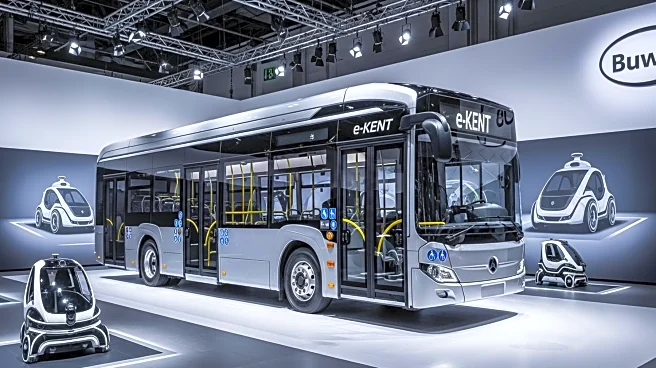What is the story about?
What's Happening?
Otokar, a Turkish bus manufacturer, introduced its new 10.9-metre e-Kent electric city bus at the Busworld Europe trade event held in Brussels. The event served as a platform for Otokar to demonstrate its expanding influence in European urban mobility. The e-Kent bus is a mid-length, zero-emission model designed to cater to the growing demand for sustainable urban transportation solutions. In addition to the e-Kent bus, Otokar showcased its autonomous e-Centro and e-Territo shuttles, highlighting the company's commitment to integrating advanced technology into public transport systems. These demonstrations underscore Otokar's strategic focus on electric and autonomous vehicle technology, aiming to address the evolving needs of urban environments.
Why It's Important?
The introduction of the e-Kent electric city bus and autonomous shuttles by Otokar is significant for several reasons. Firstly, it reflects the increasing shift towards sustainable transportation solutions in urban areas, driven by environmental concerns and regulatory pressures to reduce emissions. The deployment of zero-emission buses can contribute to cleaner air and reduced carbon footprints in cities. Furthermore, the integration of autonomous technology in public transport can enhance efficiency, safety, and accessibility, potentially transforming urban mobility. Otokar's advancements in electric and autonomous vehicles position the company as a key player in the future of urban transportation, influencing industry standards and encouraging other manufacturers to innovate.
What's Next?
Otokar's unveiling of the e-Kent bus and autonomous shuttles at Busworld suggests potential expansion into new markets and collaborations with European cities seeking sustainable transport solutions. As urban areas continue to prioritize green initiatives, Otokar may explore partnerships with local governments to deploy its electric and autonomous vehicles. Additionally, the company might invest in further research and development to enhance the capabilities and efficiency of its vehicles. Stakeholders, including city planners and environmental groups, are likely to monitor these developments closely, assessing the impact on urban infrastructure and public transport systems.
Beyond the Headlines
The introduction of electric and autonomous buses by Otokar could have broader implications for urban planning and policy-making. As cities adopt these technologies, there may be a need to update infrastructure, such as charging stations and digital connectivity, to support autonomous operations. This shift could also influence employment patterns in the transport sector, with potential changes in driver roles and the emergence of new technical positions. Ethically, the deployment of autonomous vehicles raises questions about data privacy and security, necessitating robust frameworks to protect user information.















